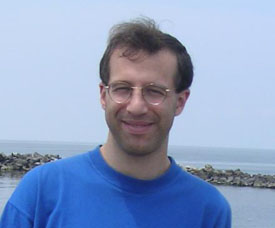Seth D. Baum, M.S.
Seth D. Baum, M.S. is Research Assistant, Department of Geography, Pennsylvania State University and Ph.D. Candidate, Geography, Pennsylvania State University.
Seth is an engineer by training working at the interface between ethics, “social” science, and “natural” science, primarily within the realm of climate change research. This breadth allows him to work in the all-too-often-neglected gaps between traditional academic disciplines and to help translate research findings from one community to another.
He is proudly part of a trend within academia towards “transdisciplinary” research. This approach to research is highly pragmatic: given the limitations of his capabilities, he will study whatever topics seem most important using whatever methods seem most helpful. He is quite fortunate to be in both a field (geography) and a university (Penn State) which are very supportive of this approach to research.
His Ph.D. dissertation research is on discounting, ethics, and climate change assessment. This research was inspired by controversy surrounding the Stern Review on the “economics” of climate change. For more on this controversy, see articles by Nordhaus, Dasgupta, Weitzman, Tol & Yohe, and the Stern Review team. He was further inspired by articles by Cowen & Parfit and Frederick on confusion surrounding discounting. Finally, he was also inspired by his advisor, Bill Easterling, who, ever the geographer, pushed him to consider discounting across space in addition to across time.
These various inspirations have led Seth to propose a new approach to discounting. His dissertation will present this approach. The work will include philosophical theory, psychological description, and application to climate change. His hope is that this work will help reduce the considerable confusion surrounding discounting and help us use discounting in ways that are more closely matched to our values.
Meanwhile, he is pursuing some other lines of research he finds important. Foremost among these is in the topic of catastrophic risk. Inspirations here include papers by Bostrom and Matheny and books by Leslie, Rees, and Posner. He hopes to bring his transdisciplinary research perspective to this all-important topic, as well as to raise awareness of it within and beyond academia.
Seth authored Reducing Catastrophic Risk Through Integrative Assessment, Beyond Infinite: A 21st Century Revolution?, Sustained development requires contributions from all of us, Alternative Meat: Lab-Grown, Reasons to choose a vegetarian lifestyle, Review of: Global Catastrophic Risks, Beyond the Ramsey model for climate change assessments, Response to Quality Science Teachers: Essential to America’s Future, and Better to exist: a reply to Benatar, and coauthored The “Hidden” Social Costs of Forestry Offsets.
Seth earned his B.S. in Optics and Applied Mathematics at the University of Rochester in 2003 and his M.S. in Electrical Engineering at Northeastern University in 2006 with the thesis User and Developer Interface Improvements to a Finite Difference Time Domain Code.
